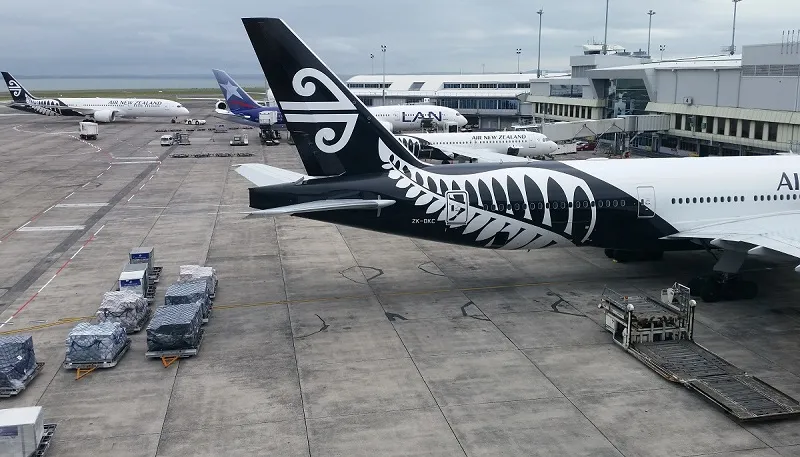
New Zealand to abolish 'bothersome' departure cards
Aug 27, 2018

New Zealand has announced plans to eliminate departure cards, which have been considered an unnecessary inconvenience for travelers. This change aims to streamline the travel process, making it simpler for both international visitors and New Zealand citizens. The departure cards, previously required to collect information about travelers leaving the country, will be replaced by more efficient digital systems. Authorities believe this move will enhance the overall travel experience and reduce administrative burdens, ultimately reflecting a modernized approach to border management. The transition is expected to take place in the near future, improving efficiency at airports nationwide.
New Zealand has made a significant move to streamline its travel processes by announcing the abolition of the 'bothersome' departure cards. This decision aims to enhance the efficiency of the travel experience for both tourists and residents alike. The departure cards, which have been a longstanding requirement for international travelers, will be phased out in favor of more modern and efficient methods of data collection. This change is expected to simplify the departure process and align with global practices.
Understanding Departure Cards
Departure cards have long been a part of New Zealand's travel protocol, requiring travelers to fill out personal information and travel details prior to leaving the country. These cards served various purposes, including:
- Collecting immigration information
- Tracking travel statistics
- Facilitating border control measures
However, as global travel continues to evolve, many countries have moved towards more efficient systems that eliminate the need for such paperwork. New Zealand's decision to abolish these cards reflects a growing recognition of the need for modernized travel experiences.
Why Abolish Departure Cards?
The decision to abolish departure cards is rooted in several key reasons:
- Efficiency: Removing the requirement for departure cards will significantly speed up the check-in process at airports.
- Modernization: Many countries have transitioned to electronic systems for collecting traveler data, making the process more efficient and less cumbersome.
- Traveler Experience: By eliminating unnecessary paperwork, New Zealand aims to improve the overall travel experience, making it more enjoyable and less stressful.
Impact on Travelers
The removal of departure cards is expected to have a positive impact on travelers. Here are some of the anticipated benefits:
| Benefit | Description |
|---|---|
| Faster Departures | Travelers will no longer need to complete departure cards, allowing for quicker processing at airports. |
| Reduced Stress | Eliminating the need for paperwork can help reduce anxiety for travelers, especially during peak travel times. |
| Better Data Collection | New Zealand can implement modern data collection methods that are more accurate and efficient. |
Global Trends in Travel Documentation
New Zealand’s move to abolish departure cards is part of a broader trend in the travel industry. Many nations are recognizing the need for streamlined processes to keep up with the increasing volume of international travel. Key trends include:
- Electronic Travel Authorizations: Countries are adopting electronic systems such as Electronic System for Travel Authorization (ESTA) or similar, which allow for pre-approval of travelers without the need for physical documentation.
- Mobile Check-In: Many airlines and airports are now offering mobile check-in options, further reducing the need for physical paperwork.
- Biometric Technology: The use of biometric scanners and facial recognition technology is on the rise, allowing for faster identification and processing of travelers.
Government Response and Future Steps
In response to the decision to abolish departure cards, the New Zealand government has expressed its commitment to improving border management and enhancing the travel experience. Future steps may include:
- Investment in Technology: Increased investment in technology to facilitate the efficient processing of travelers.
- Public Awareness Campaigns: Informing travelers about the changes and what to expect when departing from New Zealand.
- Feedback Mechanisms: Establishing systems for travelers to provide feedback on their experiences, which can help the government continuously improve the travel process.
Conclusion
New Zealand’s decision to abolish the 'bothersome' departure cards marks a significant step towards modernization in travel procedures. By embracing technology and prioritizing the traveler experience, the government aims to position New Zealand as a forward-thinking destination in the global travel landscape. This change not only aligns with international trends but also sets a precedent for other nations to follow in creating more streamlined and user-friendly travel experiences.
As travelers prepare for their journeys, the anticipation of a smoother departure process is sure to be welcomed. With ongoing improvements and the focus on efficiency, New Zealand is poised to enhance its reputation as a leading destination for international visitors.
Related Articles

Explore Thailand: The Best Islands to Visit for Paradise, Adventure, and Relaxation

The Ultimate Guide to the Best Islands in Thailand for Your Next Getaway

Do babies need passports? How to get a passport for a newborn

How to get a U.S. passport fast: here’s how to expedite the process

What is Mobile Passport Control: 5 reasons why you should use it

SENTRI vs. Global Entry: A detailed guide

Do you need a passport to go to the Bahamas? Let’s find out

Do you need a passport to go to Mexico? A detailed guide

Do you need a passport to go to Canada? We got the answer

Do You Need a Passport for a Cruise: An Essential Travel Guide

Booster Seat Requirements: All the Rules to Follow in Your Rental Car

What Are the World’s Most Powerful Passports, and How Does Yours Rank?

How to Take a Passport Photo at Home: A Helpful Guide

You've got to have heart! Southwest's new livery

Your opinion: Should water be free on low cost carriers?

Young women bolder than guys as solo travellers
